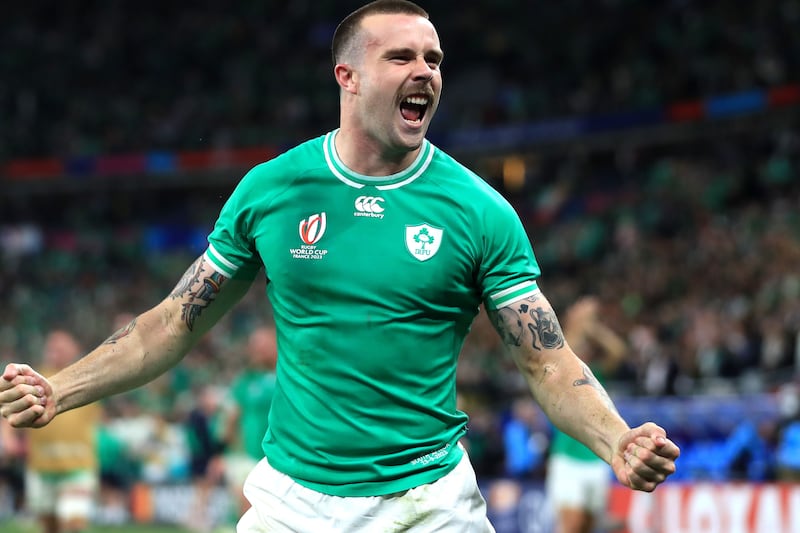After the disappointment of another quarter-final exit at the Rugby World Cup, the Irish Rugby public were a little bit unsure of what 2024 would bring.
With the added mental damage that came with the previous October’s defeat to New Zealand, there were many questions being posed as the defence of their 6 Nations title started less than four months later.
Was a rebuilding process required? Had Ireland become too predictable to play against?
One issue that needed to be addressed was who would take over from Johnny Sexton as Ireland’s out-half.
It had long been established that Sexton’s career would come to an end following the World Cup but the identity of his heir was somewhat up in the air.

Ross Byrne, Joey Carbery and Billy Burns had long been earmarked as possible candidates, but all three had long failed their auditions by the time the World Cup had come and gone.
The latest in a number of candidates to emerge were Munster’s Jack Crowley and Leinster’s Ciaran Frawley.
For Ireland’s Six Nations opener in France, Munster man Crowley got the nod.
With the Stade de France unavailable due to the summer Olympics, the game took place in the plush surroundings of the Stade Velodrome in Marseille. Any ideas that Ireland may have adapted to the alternative venue were quickly dismissed as Ireland raced into a 17-0 lead after just half an hour.
France responded with two tries, but with Jamison Gibson Park in inspired form, Ireland romped to 38-17 victory.
As Crowley delivered an almost faultless display from out-half, Joe McCarthy was another one to catch the eye. The young Leinster man delivered a barnstorming performance from the second row.

Very few visiting teams would ever leave France with a 21-point victory and the win immediately installed Ireland as hot favourites to go on a claim a first ever back-to-back Grand Slam.
An improved Italy were next at the Aviva Stadium. In a game that never caught fire, Ireland comfortably saw off the Azzurri 36-0.
It was another case of getting the job done on matchday three as Ireland dispatched Wales 31-7. The visitors who arrived in Dublin on a somewhat-hiding to nothing, put up a stubborn display for the 80 minutes and Ireland secured a bonus-point win through a late Tadhg Beirne try.

Ciaran Frawley marked his test debut with a try. The Leinster man put in a solid shift at full-back as he deputised for the injured Hugo Keenan.
Despite not reaching the levels of performance they achieved on matchday one in France, Ireland were still hot favourites to go to Twickenham and see off a below-par England side.
But going to the home of English rugby and getting a win is easier said than done.
England raced into an early lead but despite being far from their best, Ireland carried a four-point into the changing rooms. Four Jack Crowley penalties gave Andy Farrell’s side a 12-8 lead at the turnaround.
England had come under heavy criticism from their own media for a lack of attacking ideas but as they showed in a hum-dinger of a second half, when they through off the shackles, they can attack as good as anyone.
George Furbank and Ben Earl tries had Twickenham bouncing but two James Lowe tries had Ireland ahead as the clock turned red.
But with the last play of the game, England attacked and Marcus Smith’s drop goal in the 81st minute clinched a famous win for England.

It was a sickening defeat for Ireland and dreams of first ever back-to-back Grand Slams were left in tatters. But there were reasons to be cheerful a week later when Ireland clinched the championship at the Aviva Stadium with a 17-13 win over Scotland.
In a season that seemed to show no signs of ending, it was then off to South Africa for a two-game series with the world champions.
The effects of a long season that included a World Cup took its toll on the squad and Andy Farrell was forced to go without some of his most loyal foot soldiers.
Hugo Keenan, Jamison Gibson Park, Jack Conan and Mack Hansen were just some of the high-profile names that didn’t travel.

In the first test, a tired and jaded-looking Ireland feel to a 27-20 defeat. The second test was a totally different affair as a more energised Ireland came away with a 25-24 win, largely thanks in no part to two late Ciaran Frawley drop goals.
The Autumn Series in November kicked off with a rare Friday night fixture. A New Zealand team in the middle of a rebuild were first up and the feeling was that Ireland would extend their unbeaten home run to 19 games. But New Zealand had other ideas and the All-Blacks coasted to a 23-13 win.
It was perhaps the poorest display under Andy Farrell’s tenure. Matters improved slightly the following week as Ireland clung on at the death to beat Argentina 22-19.
A poor Fiji side were easily brushed aside 52-17 before a late Gus McCarthy try saw Ireland finish the series on a high note against Australia 22-19.

Performances in November failed to hit the heights that the team had set themselves, but the series was a success in terms of finding new talent.
Sam Prendergast has thrown his name into the out-half debate and an exciting duel between himself and Crowley has emerged.
Gus McCarthy, Thomas Clarkson and Cormac Izuchukwu were others to be handed debuts as Ireland look to add depth up front.
But the biggest change ahead of the Six Nations has come in the dugout. Andy Farrell leaves on a short sabbatical as he takes over as Lions head coach meaning Simon Easterby steps up from defence coach to take charge as head coach.
With Ireland going for a first-ever championship hat-trick and with Lions places up for grabs, the 2025 6 Nations is shaping up to be an interesting one.








